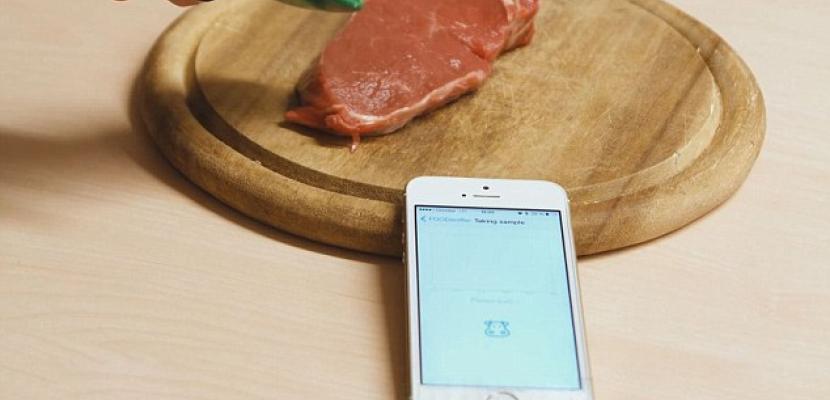Image

INNOVATIVE ELECTRONIC NOSE TO DETERMINE THE QUALITY, FRESHNESS AND SAFETY OF MEAT AND FISH
Published on 30 May 2019

Lithuania
This is the good practice's implementation level. It can be national, regional or local.
About this good practice
This practice is a good example of cooperation of innovative company “ARS LAB” and university (Kaunas Universitity of Technology) for creation of innovative product for agri-food sector.
Initiator of this idea was Augustas Alesiunas, owner of the company “ARS LAB”, after personal experience of being ill from food poisoning. Products can be spoiled for a variety of reasons: high levels of bacteria in the processing site of meat or fish, inappropriate import and store conditions, leaving the goods outside (for example, in the car) for too long, or incorrectly thawing the meat at home.
He approached researchers of Kaunas University of Technology with this idea and co-creation work has started. Portable device – FOOD Sniffer- is connected with a smart device and is used to identify if a product is fresh – a person need to target the product he/she wants to test, in an open or semi-coated package. The FOOD sniffer analyses gases surrounding a food to reveal whether it is safe to eat. By selecting the meat/fish type in your application, person receives test results on their phone.
This type of technology is the first in the world. It is sold in more than 20 countries. Recently patent for this innovation is registered in Lithuania; procedures for registering a patent in the EU and the USA also have been initiated.
The main stakeholders of this initiative: JSC “ARS LAB”, Kaunas University if Technology.
The beneficiaries of this practice: consumers; various supermarkets.
Initiator of this idea was Augustas Alesiunas, owner of the company “ARS LAB”, after personal experience of being ill from food poisoning. Products can be spoiled for a variety of reasons: high levels of bacteria in the processing site of meat or fish, inappropriate import and store conditions, leaving the goods outside (for example, in the car) for too long, or incorrectly thawing the meat at home.
He approached researchers of Kaunas University of Technology with this idea and co-creation work has started. Portable device – FOOD Sniffer- is connected with a smart device and is used to identify if a product is fresh – a person need to target the product he/she wants to test, in an open or semi-coated package. The FOOD sniffer analyses gases surrounding a food to reveal whether it is safe to eat. By selecting the meat/fish type in your application, person receives test results on their phone.
This type of technology is the first in the world. It is sold in more than 20 countries. Recently patent for this innovation is registered in Lithuania; procedures for registering a patent in the EU and the USA also have been initiated.
The main stakeholders of this initiative: JSC “ARS LAB”, Kaunas University if Technology.
The beneficiaries of this practice: consumers; various supermarkets.
Resources needed
Project budget –50.000 Eur in the first stage for product development from EU funds (Horizon 2020 programme). In the second stage – 10.000 from EU structural funds coordinated by Public Institution Lithuanian Business Support Agency.
10 persons were working in the project.
10 persons were working in the project.
Evidence of success
Continuation of cooperation. Co-creation of new products have started between the “ARS LAB” and researchers of Kaunas University of Technology. New device will assess features of oil and minced meat.
Sales of electronic nose – FOOD sniffer - in the market. It is sold in more than 20 countries.
Sales of electronic nose – FOOD sniffer - in the market. It is sold in more than 20 countries.
Potential for learning or transfer
This practice is a good example of cooperation between science and private companies of innovation-driven agri-food sector for policymakers and public institutions in other countries that are responsible for various support measures (from national and the EU funds) supporting cooperation of science and private entities for innovation actions.
This practice demonstrates an example how successful cooperation can be created depending on the needs and type of innovation. The most important aspect is to find employees and researchers who would be encouraged to work as co-creators and would be motivated for the final product. This practice also can be a good example for policymakers for learning how cooperation was initiated, how work was implemented and what new innovative cooperation actions were created.
This practice demonstrates an example how successful cooperation can be created depending on the needs and type of innovation. The most important aspect is to find employees and researchers who would be encouraged to work as co-creators and would be motivated for the final product. This practice also can be a good example for policymakers for learning how cooperation was initiated, how work was implemented and what new innovative cooperation actions were created.
Further information
Website
Good practice owner
You can contact the good practice owner below for more detailed information.
Organisation
JSC “ARS LAB”

Lithuania
Contact
Head of Rural development division